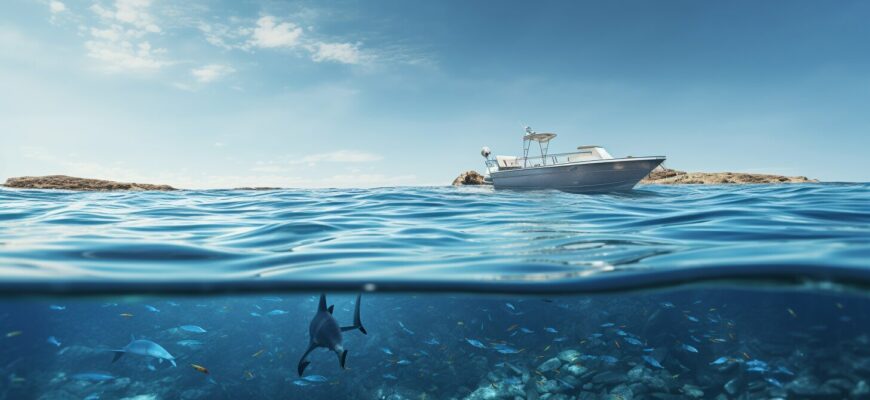Welcome to this informative article about shark attacks on boats. Sharks have long been portrayed as fearsome predators, and many people wonder if they pose a risk to vessels on the water. In this article, we will uncover the truth about shark attacks on boats and provide insights into shark behavior, real-life case studies, and practical safety measures to mitigate the risk. So, let’s dive right in and separate fact from fiction when it comes to sharks and boats.
- Understanding Shark Behavior
- Understanding Shark Behavior
- Case Studies: Shark Attacks on Boats
- Understanding Patterns and Mitigating Risks
- Shark-Boat Interactions: Accidental or Intentional?
- Shark-Boat Interactions: Accidental or Intentional? – Real-Life Examples
- Factors that Attract Sharks to Boats
- How to Minimize the Risk of Shark Attacks on Boats
- Tips for Surviving a Shark Attack on a Boat
- 1. Stay on the boat
- 2. Create a barrier
- 3. Call for help
- 4. Use a shark repellent device
- 5. Keep an eye on the shark
- 6. Protect yourself
- 7. Stay in a group
- The Importance of Shark Conservation
- Frequently Asked Questions (FAQ)
- Q: Are shark attacks on boats common?
- Q: Why do sharks attack boats?
- Q: Can a shark sink a boat?
- Q: What should I do if a shark approaches my boat?
- Q: How can I minimize the risk of a shark attack on my boat?
- Q: What safety measures can I take to protect myself and my boat?
- Q: How common are shark attacks on people swimming near boats?
- Q: How can I contribute to shark conservation?
Understanding Shark Behavior
Sharks are fascinating creatures, but their behavior can often be misunderstood. When it comes to their interactions with boats, it’s important to have a clear understanding of how they behave in order to separate fact from fiction.
One key aspect of shark behavior to consider is their feeding patterns. Sharks are primarily attracted to the scent of blood and the movement of potential prey. Their keen sense of smell allows them to detect even small amounts of blood from a considerable distance.
However, it’s important to note that sharks do not typically see boats as a source of food. They are more likely to be drawn to boats that are engaged in activities such as fishing, where bait and the presence of fish can pique their interest.
Additionally, sharks are known to be curious creatures and may investigate objects in their environment, including boats. This curiosity, combined with their natural instinct to explore their surroundings, can lead to close encounters with boats.
It’s crucial to understand that most shark encounters with boats are unintentional and result from the shark’s natural behavior rather than any malicious intent. Sharks are not actively seeking out boats to attack or harm humans.
Understanding Shark Behavior
There are several key points to remember when it comes to understanding shark behavior:
- Sharks are primarily attracted to the scent of blood and the movement of potential prey.
- Sharks do not typically see boats as a source of food, but may investigate them out of curiosity.
- Most shark encounters with boats are unintentional and do not involve any aggressive behavior on the part of the shark.
Case Studies: Shark Attacks on Boats
While shark attacks on boats may seem rare, there have been documented cases throughout history that highlight the potential danger that these marine predators can pose. By analyzing these incidents, we can gain insights into the circumstances surrounding shark attacks on boats and better understand how to minimize the risk.
One notable case occurred in 1945 off the coast of Vanuatu. The crew of a small fishing vessel reported a violent encounter with a great white shark. The shark, estimated to be over 15 feet in length, repeatedly rammed the boat, causing significant damage. Thankfully, the crew managed to escape unharmed, but the incident left them shaken.
Another incident took place in 2008 near Guadalupe Island, Mexico. A group of divers exploring the area encountered a curious great white shark. At first, the shark circled their boat, seemingly uninterested. However, as one of the divers entered the water, the shark suddenly lunged at the boat, striking it with tremendous force. Fortunately, no one was injured, but the encounter served as a reminder of the unpredictability of shark behavior.
These case studies demonstrate that shark attacks on boats can happen, albeit infrequently. It is important to note that the motivations behind these attacks are not always clear. While some incidents may be due to accidental or exploratory behaviors, others could be a result of territoriality or perceived threats.
Understanding Patterns and Mitigating Risks
By examining the circumstances surrounding these attacks, experts have identified certain patterns and risk factors that increase the likelihood of shark-boat interactions. Factors such as the presence of prey, fishing activities, and specific boat types have been associated with a higher risk of shark encounters.
For example, areas with high fish populations often attract sharks, as they follow the natural prey. Additionally, fishing activities can inadvertently attract sharks by creating a concentrated source of food. In some cases, certain boat types, such as those with engine noises resembling distressed prey, may also draw the attention of sharks.
While it is nearly impossible to eliminate the risk entirely, there are steps that boaters can take to minimize the likelihood of shark attacks on boats. By practicing responsible fishing techniques, avoiding the disposal of fish waste near the boat, and investing in acoustic deterrent devices, boaters can reduce the attractiveness of their vessels to sharks.
Furthermore, maintaining situational awareness and being prepared for shark encounters are essential. Boaters should familiarize themselves with local shark behavior, carry effective shark deterrents, and have a plan in place for responding to an encounter. This includes staying calm, avoiding sudden movements, and creating distance between the boat and the shark.
While shark attacks on boats are relatively uncommon, being informed and taking proactive measures can help mitigate the risks associated with these interactions. By respecting the natural behavior of sharks and implementing safety precautions, boaters can enjoy their time on the water while minimizing the chances of encountering these magnificent creatures in a potentially dangerous situation.
Shark-Boat Interactions: Accidental or Intentional?
When it comes to shark-boat interactions, a common question arises: are these encounters usually accidental or intentional? Understanding the nature of these interactions can help boaters better prepare and respond to potential situations. Let’s explore this topic further.
Sharks are highly curious creatures and are often attracted to objects in the water. While most interactions between sharks and boats are accidental, there have been instances where sharks have shown intentional behavior towards boats.
According to marine experts, accidental shark-boat interactions typically occur when sharks mistake boats for prey or are simply investigating their surroundings. In these cases, the shark may approach the boat out of curiosity or confusion.
On the other hand, intentional shark attacks on boats are rare but have been documented. These occurrences are usually associated with specific circumstances, such as chumming or baiting the water to attract sharks for observation or filming purposes. While intentional interactions may provide research opportunities, they also come with increased risks.
Shark-Boat Interactions: Accidental or Intentional? – Real-Life Examples
Let’s examine a couple of examples to shed further light on the topic.
| Example 1 | A group of researchers was conducting a study on shark behavior in the presence of boats. They intentionally chummed the water, which attracted several sharks. One of the sharks, mistakenly associating the boat with food, made contact with the vessel while attempting to feed. This was an intentional interaction due to the baiting activity. |
|---|---|
| Example 2 | A fishing charter was operating in an area known for its shark population. While the crew was cleaning the day’s catch, residual blood and fish waste were released into the water. This attracted several sharks that approached the boat, creating accidental interactions as the sharks investigated the source of the scent. |
These examples illustrate how both accidental and intentional interactions can occur in different scenarios. It is crucial for boaters to be aware of their surroundings and take appropriate measures to minimize the risk of any potential interactions.
Next, we will explore the factors that may attract sharks to boats, shedding light on why these interactions might occur in the first place.
Factors that Attract Sharks to Boats
Understanding the factors that may attract sharks to boats is crucial for boaters who want to minimize the risk of shark attacks. While sharks generally do not view boats as prey, certain factors can pique their curiosity or draw them closer. Let’s explore some of these factors:
- Fishing Activity: One major factor that can attract sharks to boats is the presence of fishing activity. When anglers are actively fishing or cleaning their catch, the scent and movement of baitfish can lure sharks towards the boat. In some cases, the vibrations caused by struggling fish may also catch the attention of sharks nearby.
- Prey Presence: Sharks are opportunistic predators and are attracted to areas with abundant prey. If a boat is located in an area where prey species, such as schools of fish or marine mammals, are plentiful, sharks may be drawn to the area in search of a meal. The activity and commotion caused by prey animals can also catch the attention of sharks.
- Type of Vessel: The type of vessel can also play a role in attracting sharks. Research suggests that certain characteristics, such as the sound or vibrations produced by propellers or engines, can pique the curiosity of sharks. Additionally, larger vessels may create artificial reefs, attracting marine life and potentially sharks as well.
It is important to note that while these factors may increase the likelihood of shark sightings near boats, actual attacks on boats are extremely rare. Sharks are generally more interested in natural prey sources and do not commonly perceive boats as viable targets. However, understanding these factors can help boaters stay informed and take appropriate precautions to minimize any potential risks.
How to Minimize the Risk of Shark Attacks on Boats
When it comes to boating in shark-infested waters, taking precautions is essential to minimize the risk of a shark attack. By following these safety measures, you can enjoy your time on the water while ensuring your safety:
- Be mindful of shark-prone areas: Stay informed about areas where shark activity is prevalent. Local marine authorities or research organizations can provide valuable information about locations to avoid or exercise caution.
- Avoid fishing near swimming areas: If you’re planning to fish, try not to do so near designated swimming areas. The scent and struggling fish can attract sharks, potentially increasing the chance of an interaction.
- Properly dispose of bait and fish waste: Dispose of bait and any fish waste properly and responsibly. Leaving scraps in the water can attract sharks, leading to unintended encounters.
- Stay in groups: While on the water, it’s safer to stay in a group rather than venturing out alone. Sharks are less likely to approach a larger group of people or boats.
- Avoid excessive splashing or loud noises: Sharks are attracted to splashing and loud noises, as they can resemble the movement and sound of distressed prey. Minimize excessive splashing and keep noise levels down to reduce the chance of drawing attention.
- Never feed sharks: Feeding sharks, intentionally or unintentionally, can create an association between humans and food. This can lead to more aggressive behavior in the future, increasing the risk of attacks.
- Secure and avoid dangling limbs: Keep your limbs inside the boat and avoid dangling them in the water. Sharks may mistake them for prey and attempt to investigate, potentially resulting in an accidental interaction.
- Use shark deterrent devices: Consider using shark deterrent devices, such as electronic repellents or acoustic devices. While their effectiveness varies, they can provide an additional layer of protection.
- Stay informed and updated: Keep up-to-date with the latest information and research on shark behavior and safety measures. The more knowledge you have, the better equipped you’ll be to make informed decisions while boating.
While these measures can significantly reduce the risk, it’s important to remember that no method is foolproof. Understanding and respecting sharks as vital members of marine ecosystems is crucial in maintaining a healthy balance. By practicing responsible boating and conservation efforts, we can coexist with these magnificent creatures and ensure their long-term survival.
Tips for Surviving a Shark Attack on a Boat
If you find yourself in a situation where a shark is attacking your boat, it’s crucial to remain calm and take immediate action to ensure your safety. While shark attacks on boats are rare, it’s important to be prepared and know what to do. Here are some tips to help you survive a shark attack on a boat:
1. Stay on the boat
The safest place to be during a shark attack is on the boat itself. Sharks are less likely to continue their attack if you are out of the water. Do not attempt to jump into the water as this may provoke the shark further.
2. Create a barrier
If possible, create a physical barrier between you and the shark by using any available equipment such as oars, paddles, or boat hooks. This can help discourage the shark from approaching the boat and protect yourself and others on board.
3. Call for help
Use your marine radio or any other communication device to call for help immediately. Alert the Coast Guard or any nearby vessels about the situation. They can provide assistance and ensure your safety.
4. Use a shark repellent device
Consider carrying a shark repellent device on board. These devices emit sounds or electrical signals that can deter sharks. While their effectiveness may vary, they can be a useful precautionary measure.
5. Keep an eye on the shark
Monitor the shark’s behavior closely. If it starts to lose interest and swim away, you can slowly and cautiously move away from the area. However, if the shark continues to circle the boat, it’s important to maintain a defensive posture and be prepared to take further action, if necessary.
6. Protect yourself
If a shark manages to breach the boat or make contact with you, it’s crucial to protect yourself. Use anything available as a defensive tool, such as a boat hook, fishing rod, or even your fists. Aim for the shark’s sensitive areas, such as its eyes or gills, to deter it from further attacking.
7. Stay in a group
If there are others on board, stick together. Sharks are more likely to be deterred by a larger group of people. Stay close to one another and avoid straying too far from the safety of the boat.
Remember, while these tips can help minimize the risk of a shark attack, prevention is key. Avoid attracting sharks to your boat by following proper boating and fishing practices, and respect the natural habitat of these magnificent creatures. By taking precautions and understanding shark behavior, you can enjoy your time on the water with peace of mind.
The Importance of Shark Conservation
Sharks are not only fascinating creatures but also play a crucial role in maintaining the balance of marine ecosystems. As apex predators, they help regulate the populations of other marine species, ensuring the health and sustainability of our oceans. However, sharks worldwide face numerous threats and are in urgent need of conservation efforts.
One of the primary reasons for conserving sharks is their vulnerability to overfishing. Despite their fierce reputation, many shark species are slow-growing and reproduce relatively slowly, making them highly susceptible to overexploitation. Overfishing has led to significant declines in shark populations, disrupting the delicate ecological balance and potentially leading to cascading effects throughout the marine food web.
Furthermore, sharks play a crucial role in maintaining healthy coral reefs. They help control the populations of herbivorous fish, which in turn prevents overgrazing of algae and promotes the growth of corals. Without sharks, coral reefs can become overgrown with algae, leading to degradation and loss of this vital marine habitat.
Conserving sharks also has economic benefits. Shark tourism has become a significant source of income for many coastal communities around the world. People are drawn to areas known for their shark populations, such as shark diving destinations, contributing to local economies and providing incentives for protecting these important marine creatures.
Efforts to conserve sharks include implementing stricter fishing regulations, establishing marine protected areas, and promoting education and awareness about the importance of sharks in marine ecosystems. By protecting sharks, we can safeguard the health of our oceans, maintain biodiversity, and support sustainable fisheries.
It is crucial to recognize that conserving sharks is not only about protecting a single species but about preserving the delicate balance of the entire marine ecosystem. Every effort to conserve sharks contributes to the overall health and resilience of our oceans, benefiting not only marine life but also the countless communities and industries that rely on these precious resources.
Frequently Asked Questions (FAQ)
Curious about shark attacks on boats? Here are some commonly asked questions and their answers to help you understand this topic better.
Q: Are shark attacks on boats common?
A: No, shark attacks on boats are relatively rare. While there have been documented cases of sharks interacting with boats, intentional attacks are extremely uncommon.
Q: Why do sharks attack boats?
A: Sharks may approach boats out of curiosity, mistake them for potential prey, or be attracted by certain factors such as fishing activity or food remnants in the water. However, it is important to note that most shark-boat interactions are accidental and non-aggressive.
Q: Can a shark sink a boat?
A: It is highly unlikely for a shark to sink a boat. Sharks lack the physical capability to puncture or damage a boat’s hull significantly. Even large sharks like great whites are not strong enough to topple or sink a boat.
Q: What should I do if a shark approaches my boat?
A: If a shark approaches your boat, it is generally recommended to remain calm and avoid any sudden or aggressive movements. Maintain a safe distance, and if necessary, gently discourage the shark by making noise or splashing water. Remember, most shark encounters are harmless and short-lived.
Q: How can I minimize the risk of a shark attack on my boat?
A: To minimize the risk of a shark attack, avoid activities that may attract sharks, such as fishing with live bait or throwing fish scraps overboard. Additionally, refrain from swimming near the boat if sharks are present, as this may inadvertently lure them closer.
Q: What safety measures can I take to protect myself and my boat?
A: It is advisable to have a shark deterrent device, such as an electric shark repellent, on board. Ensure your boat is in good condition, with no food or fish remains in the water or on deck. Familiarize yourself with emergency procedures and have safety equipment readily available.
Q: How common are shark attacks on people swimming near boats?
A: Shark attacks on people swimming near boats are extremely rare. Sharks are generally more interested in their natural prey than humans. However, it is always wise to exercise caution and adhere to safety guidelines when swimming in areas known to have shark populations.
Q: How can I contribute to shark conservation?
A: Supporting shark conservation organizations, spreading awareness about the importance of sharks in marine ecosystems, and practicing responsible fishing techniques are all ways to contribute to shark conservation efforts.
These answers should provide you with a better understanding of shark attacks on boats. Remember, while it’s essential to be informed, it’s also crucial to maintain a balanced perspective on shark behavior and their interactions with boats.









